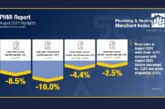
Initiatives on new homes, vocational training and help for businesses were revealed by the Chancellor of the Exchequer, George Osborne MP, as he gave his Autumn Statement to Parliament. Mr Osborne also set out details of his Comprehensive Spending Review that governs levels of public spending for both central and local government over the next 4 years up to 2020.
Here, John Newcomb, BMF Managing Director, gives his reaction on the main issues:
Home Ownership
“Ministers have told the BMF that 86% of people in this country want to become homeowners. But The Times’ newspaper yesterday reported on international comparisons showing the level of home ownership in the United Kingdom fell to 64.8% last year, down from a 2007 peak of 73.3%. So it is no surprise the Conservatives are concentrating on the General Election Manifesto pledge to have many more homes build – notably with their Help To Buy and Starter Homes policies.
“The Chancellor has signalled clear policy intent by doubling the housing budget to £2 billion a year. The impetus behind equity loan, mortgage guarantee and shared ownership schemes will enable builders to recruit the people and invest in the land and materials required.
“The extra 3% in Stamp Duty on people who buy second homes or buy-to-let properties was a surprise. But during the Election, David Cameron and George Osborne made many visits to the West Country where young people are being priced out of home ownership. It is understandable they want the money raised from higher Stamp Duty to invest in areas such as Cornwall.
“There is a great deal to be done to build many more new homes to ease the housing crisis. The BMF and its members stand ready to help builders of all sizes to satisfy rising demand for homes”.
Vocational Training & Skills
“Despite media stories predicting big cuts in adult skills in further education, no change in projected funding levels is welcome news. Colleges play an important role in helping young people and adults acquire the construction skills we need if we are to build the homes required.
“But the long-awaited detail on how the proposed Apprenticeships’ Levy will operate is a cause for concern. Setting the Levy at a rate of 0.5% of an employer’s payroll is higher than necessary – the BMF argued for a lower figure of no more than 0.3%. The Government’s original aim was for it to apply to larger companies. But BMF members now see it will be imposed on firms with a payroll of more than £3 million a year. This means smaller firms, who perhaps employ less than 200 staff, may now become liable to pay the Levy. This is not good news”.
Helping Businesses
“Extending Small Business Rate Relief for another year looks appealing but has little effect on BMF members. Most are currently at a disadvantage because they tend to be small businesses with a large trading footprint. No account is taken of space utilisation, company size, or staff numbers.
“Mr Osborne failed to mention the on-going review into the structure and burden of business rating. Current arrangements are out-of-date and he should resist the temptation to tinker on the edges. Rates need to be urgently and completely overhauled to make them fairer for merchants.
“Manufacturing BMF members will doubtless be pleased the Chancellor will exempt permanently energy-intensive industries like steel, ceramics & chemicals from the cost of environmental tariffs.”









